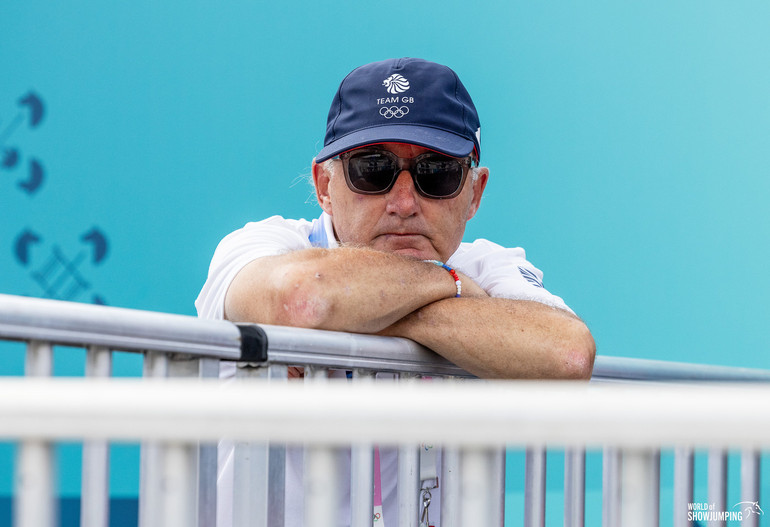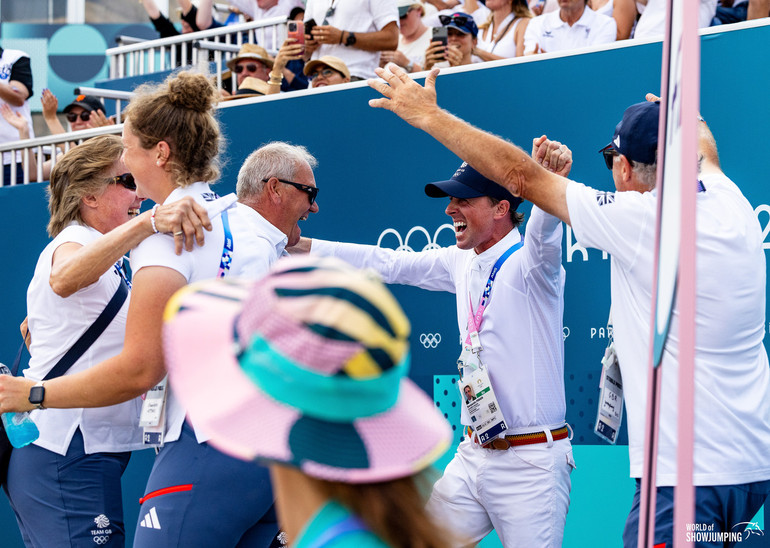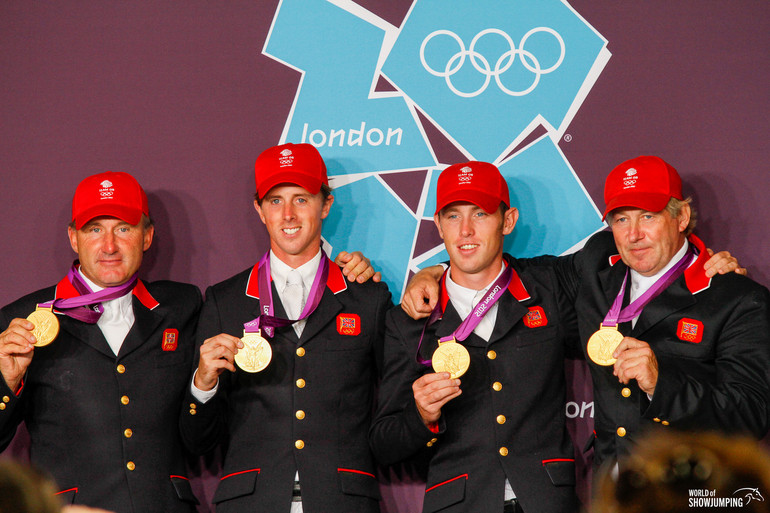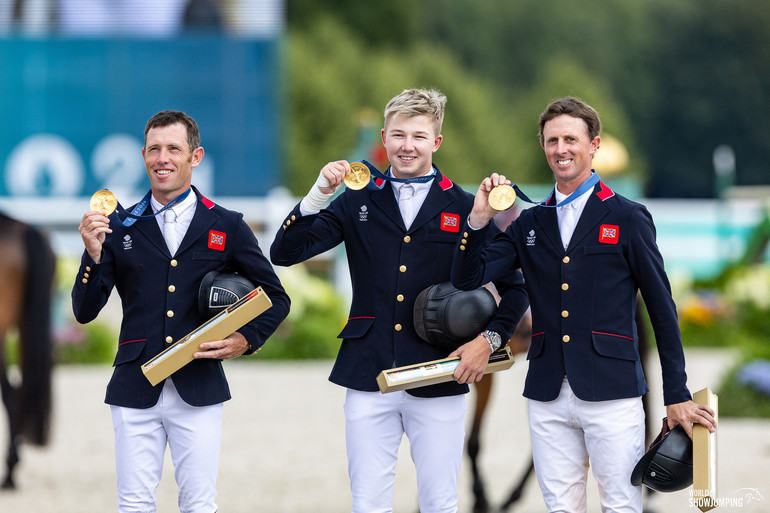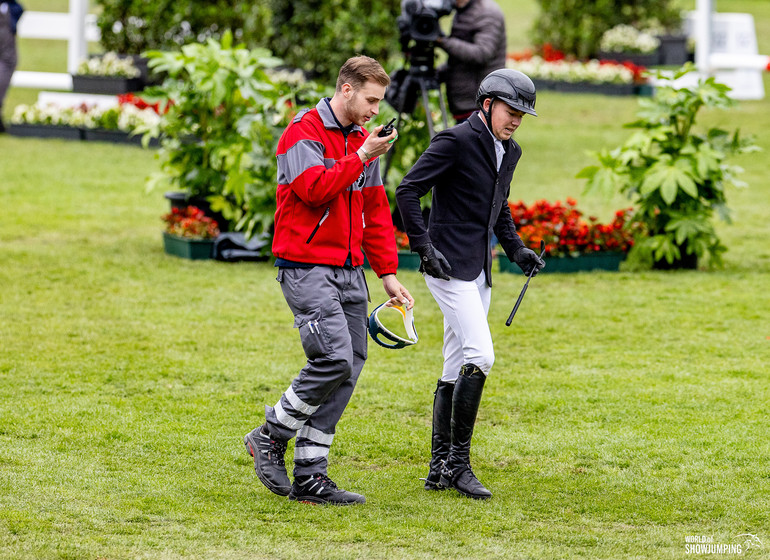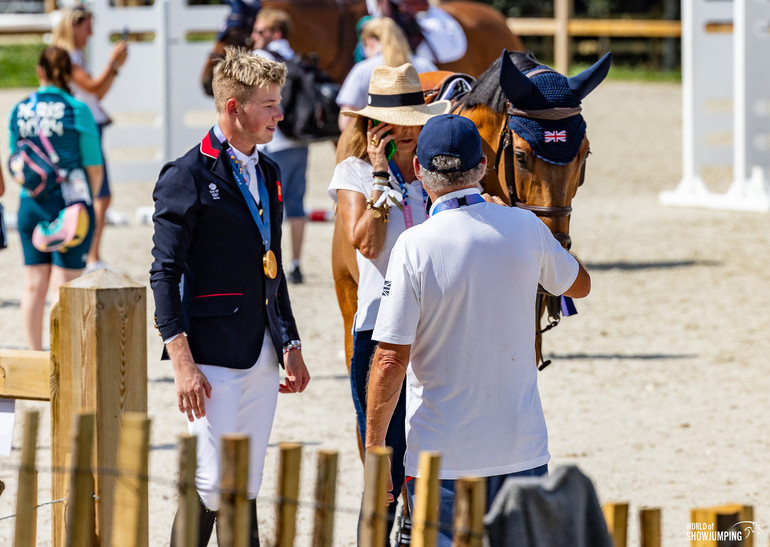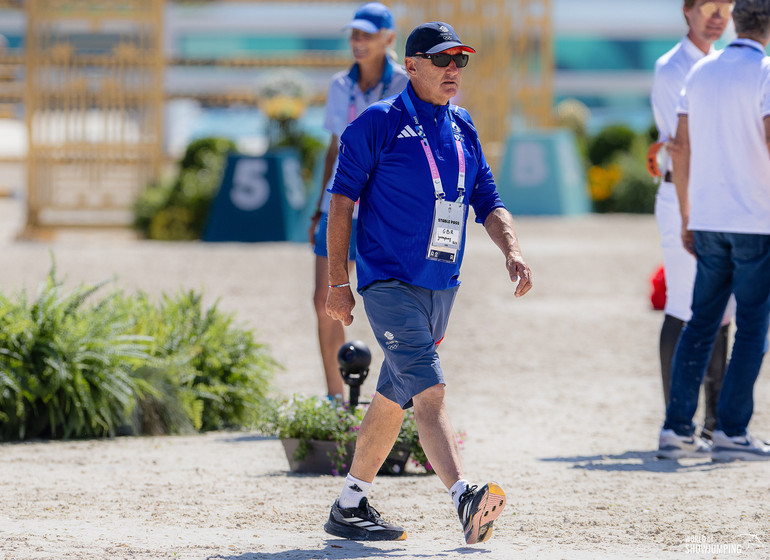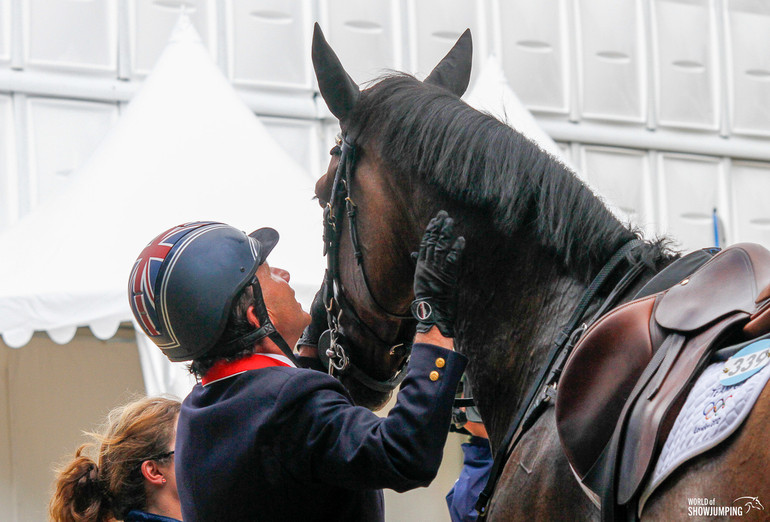Text © World of Showjumping
“Harry was right there with us in London with Scarlett and Sienna, his two little sisters. He was a very inquisitive little chap holding my hand in the celebrations. I've watched Scott and Ben’s journey, as I've watched and been part of Harry’s – and I couldn't be happier that Harry did this with them,” Peter Charles tells as he speaks to WoSJ about his feelings witnessing his own son be part of the British team that claimed Olympic gold in Versailles, twelve years after he himself stepped on to the top of the podium in London.
In 2012, at the age of 27, Scott Brash was in the starting blocks of his career when he together with Ben Maher – then 29 – claimed Olympic team gold on home soil in London, alongside Nick Skelton and Peter. To see Harry, at 25, win Olympic team gold twelve years later – riding Romeo 88 – together with Brash and Maher, was pure magic and a moment Peter will never forget.
“We nearly got a tear out of my father,” Harry joked about his dad, not one to put a lot of emotions on display.
The biggest task
As the British anchors Scott Brash and Hello Jefferson were making their way down to the ring in Versailles to decide the Olympic team medals, the gold was within reach – but they had very little to play with. Two time penalties was all Brash could allow himself; three would result in a jump-off against USA, and anything more, the gold would slip away. Walking alongside Brash from the warm-up, Ben Maher turned to Peter Charles and asked about his thoughts. “This is his biggest job ever,” Peter said to Maher, promising him a kiss if Brash would jump clear. Peter kept his promise – ignoring the tiny time fault added to the Brit’s overall score of two. “And that is about as emotional as I got,” Peter laughs. “Scott’s round was another level of riding, as was Ben and Harry’s. All three horse-and-rider combinations delivered their own rounds of perfection.”
All three horse-and-rider combinations delivered their own rounds of perfection
The riders on the British team left little doubt that Peter is much more than a supportive parent. “Pete played a massive role here, it is invaluable having him on our shoulder, giving us advice, going in and out of the ring with what we need to do – just having that mentor there is really good for all of us,” Brash said after having won the team gold in Versailles.
When the opportunities are there, you have to grab them with both hands
“My last Olympics before London was Atlanta in 1996, where I got very close to the individual medal – which left me very disappointed,” Peter explains. “At the time, I thought that I would simply be ready for Sydney in four-years-time – but I actually didn't have a horse in the Olympic cycle for another 16 years. That really made me realize how lucky I was to have Vindicat – who replaced Pom d’Damme right at the last minute – to do the Olympics on home soil at the age of 52. Having the right horse in the right form, and as a rider being in the best shape at that specific moment in time is not a given!”
I was very lucky to have that moment at 52; I believed it had passed me by
“Big Star was a superstar, but Sanctos was still an unknown horse – and Scott was finding his feet, while Ben had a solid horse in Triple X,” he continues. “Jumping on home soil added another layer of pressure, but back then we had the luxury of a four-man team – which was very important in London. I was very confident, and even told my wife Tara that if it came down to me jumping clear to win a gold medal, I could not wait. Having that kind of responsibility is what you train for all your life, it's what you want as a rider; to test yourself against the best. And the ultimate test for me was having to jump clear in the jump-off with that pressure. I was very lucky to have that moment at 52; I believed it had passed me by. I was so fortunate to have a little horse Vindicat, who came into the Olympic selection very late, at that moment… Everything simply went the right way; it was meant to be.”
Bouncing off the best
For Peter – who in 2013 took a step back from his own riding to focus solely on his children and their careers – seeing his son Harry jumping on the Olympic team alongside Ben Maher and Scott Brash twelve years after London was a dream come true.
“It made me very proud and extremely grateful. I knew Harry would be in good hands; Ben and Scott are two of the world's very best and super professional, and Harry could bounce off their experience, their professionalism, their positivity,” Peter says.
They earned this gold with their work ethic, horsemanship, their meticulous planning
“Hopefully, people will see what these guys have achieved and use it as an inspiration. None of them have done it without great talent, but they have also been able to apply that talent to achieve their goals and ultimately on the biggest stage of all – the Olympics. The number of times I’ve heard every Tom, Dick and Fred say ‘I've got an Olympic horse’ or ‘I’m going to the next Olympics’, I know they haven’t got a clue – believe me, it is not for the faint-hearted.”
“They earned this gold with their work ethic, horsemanship, their meticulous planning. It is important to point out how much of a team effort went into it, all three are well organised in that respect with detailed planning – and have top-level grooms, such as Georgia who is Harry’s groom. Sure enough, you need money to pay the bills – it helps when you are having a bad day – but ultimately, how these boys rode was unbelievable and a testament to the sport they represent. Failure is part of any sport and in life, but it’s how you react to it which sets you apart from your competitors.”
A setback in Aachen
And speaking of disappointments, the road to Paris was not short of drama for the Charles-family. Four weeks away from the Olympic Games, Harry sustained two fractures to his arm and wrist during a freak accident at CHIO Aachen. “I can find a positive out of every negative, but this was a tough one,” Peter says. “Obviously, what happened in Aachen was unfortunate. It was one of those things that can happen on the field of play; every time you put your foot in a stirrup, there is a risk that something can go wrong. It's easy to celebrate winning, but when you've had a setback, that's when you need to be at your best. When you hit a low, that's when you actually need to be your most positive – with the right infrastructure. You need to be able to go to work and fix the problems.”
While the whole family and Harry’s close team decided to give it their all to make it to Paris despite the setback, Peter was adamant that if Harry was to go, he had to be able to perform a 100%. “If something went wrong at the Olympics, it couldn't be because of the arm,” Peter explains. “Anything else could go wrong, but I didn't want him to get halfway around the ring and not be able to ride properly because of the arm.”
I can find a positive out of every negative, but this was a tough one
Giving the arm a full rest for two weeks was necessary for the healing process. “Helen Nicholls organised us the best doctors and medical advice,” Peter goes on to explain. “My long-standing physio John Harris devised a way to strap the wrist like a boxer, which gave a lot of support.”
While Harry was worried about missing two weeks of riding, Peter kept Romeo ticking over for him. “All I did was work him away from the jumps; we went hacking, we went through cross country jumps in the woods. And it freshened Romeo right up, it was fantastic. However, there was one big question mark hanging over us; could Harry ride in the ring at five-star level before the Olympics? And we were only going to get one chance to do this and that was in the King George at Hickstead. Seeing him come out of the ring there with a big smile on his face, with no pain in his arm, gave us the green light.”
An integral part of the team
“If you don't separate the two, it's emotionally too difficult,” Peter says about being both a trainer and a dad. In Versailles, Peter was also an integral part of the British team, with both Scott and Ben being quick to thank him for his contributions to the team. However, in his own words, Peter “did not do much.”
I will advise them on what I think is a good idea, but you can't give a riding lesson at the Olympics
“We had a great team going,” he explains. “We had great support from our owner Ann Thompson – who has shown immense support – and from all our sponsors. Additionally, the World Class-program from British Equestrian provided us with help as well, and everyone on the British team was brilliant – from our chef d’equipe Di Lampard and her technical advisor Stanny Van Paesschen to Roman, our home vet, and Tim, our team vet, as well as Rachel and Jenny, our horse and human physios. We also had a fantastic place to live, away from all the buzz; there were no distractions.”
“Good riding and good horses have always solved a lot of problems. The boys knew great results had got them this far so there was no point to reinvent the wheel at this late stage,” Peter continues. “The atmosphere in the camp was excellent, as good as I've ever seen, there was absolutely no negativity. We had Joe Stockdale down as our reserve rider and he was fantastic. He was super positive about everything and a great teammate to have in that position.”
“Myself, I didn't do much…,” Peter says. “All I ever do is be there for them. I won’t tell them what to do. I will advise them on what I think is a good idea, but you can't give a riding lesson at the Olympics. You can't give riding lessons in the collecting ring at any show! Sometimes helping is just a confirmation of what they are doing so they become super confident in their split-second decision making. There was no room for error, so our job as a team was to make sure that everyone went into the ring at their best – and the boys then had to do their job, nobody could ride a horse for them. For Harry to be part of the team with Ben and Scott brought its unseen advantages; for the last few years he has seen first-hand their attention to detail. That impression can’t fail to have an effect to impress upon your own thought-process, and ultimately mould you to be the best rider and horseman you can be.”
“The worst moment though, came when we won,” Peter recalls. “I slightly ran the wrong way into where President Macron was congratulating the French team, one of his gang grabbed me but I dodged past him and then two more giants only just caught me in a headlock and arm up the back. My French was never great but these chaps weren’t for listening – and I very nearly missed the whole thing.”
Convert the positivity
As for the future, Peter hopes that the consistent success the British showjumpers have enjoyed throughout the last four Olympic cycles does not go unnoticed on home soil. “I think it is sad that we have won four Olympic gold medals, but we haven’t got a show circuit in Great Britain that reflects this. And we used to have the best! Maybe it's romantic of me to think that we could have a world class show circuit again, after winning all these titles. We need a lot of thought and the right investment and the right persons, for example we haven't got one decent indoor arena in the south of England,” he says.
“Looking at the bigger picture, showjumping as a stand-alone sport is fantastic; it's the best equestrian sport we've got by a long way,” Peter says about the equestrian sport as part of the Olympic movement. “I know showjumping has done a massive advert for itself in Versailles on what we can offer and how exciting a sport it is. As to the format, it is here to stay and no one can say this isn't top sport; it's brilliant to watch. It's very marketable in terms of selling the sport because normal people understand it. It's not complicated, and it is high drama when every fault and mistake is highlighted."
These Olympics proved that we are moving in the right direction to ensure a sustainable future
"However, we need really good discussions, and there are still details that need to be ironed out. The pressure with the three per team is enormous and there is no room for error. I believe we should be mindful of not putting the riders under too much pressure, either so just for the Olympics is enough. To keep the three per team format for the Olympics, there needs to be a certain proportionality in the rules and we need to improve the standard of qualification as well; no Mickey Mouse riders, please. Behind the scenes, I believe that everyone is working together and these Olympics proved that we are moving in the right direction to ensure a sustainable future.”
“We are making lifelong memories and partnerships with these wonderful animals,” Peter concludes. “There is so much good, there is so much positivity in having horses in life and in sport and we should focus on that.”
1.10.2024 No reproduction of any of the content in this article will be accepted without a written permission, all rights reserved © World of Showjumping.com. If copyright violations occur, a penalty fee will apply.



